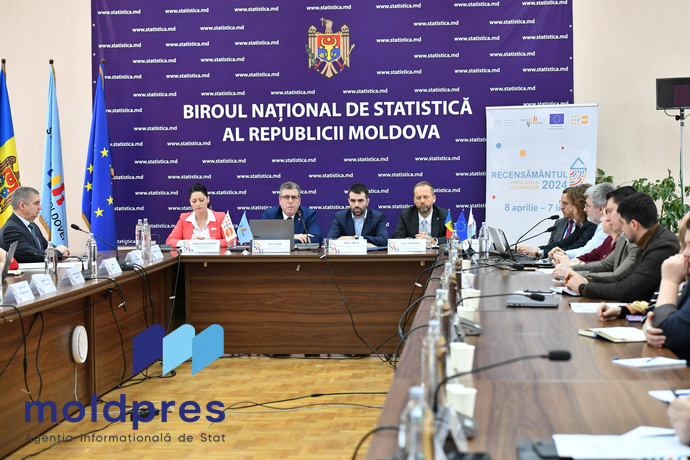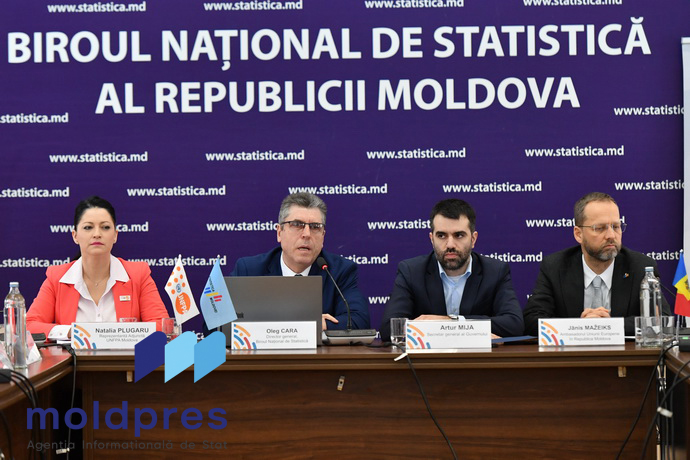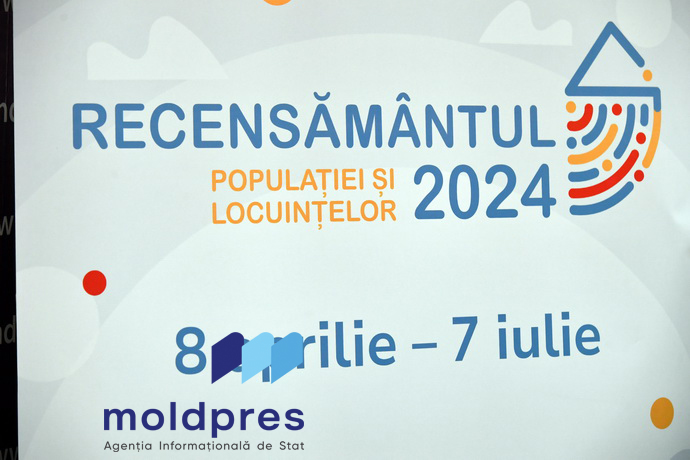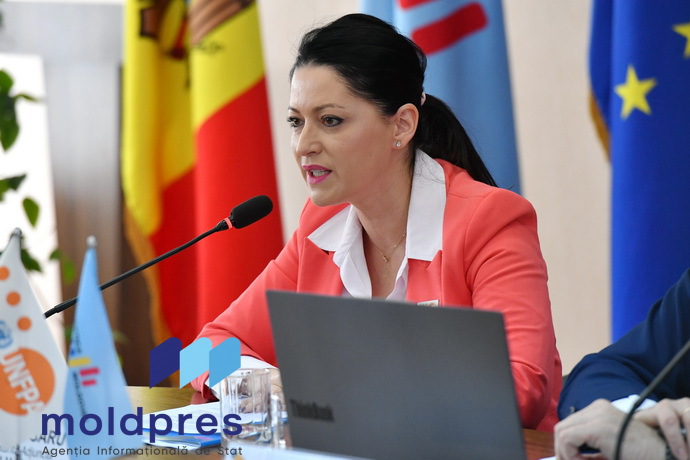
Census: Moldova's population stands at 2.4 million citizens in 2024
The population of Moldova stood at 2.4 million citizens in 2024, compared to 2.7 million in 2014. Thus, the population number (with usual residence) decreased by about 13.9% in the last ten years. The decrease during this period was influenced by the diminution of the natural increase and the negative balance of external migration. Representatives of the National Bureau of Statistics (NBS) today unveiled data to this effect, following the conducting of the 2024 Census.
According to the NBS, the share of the urban population has increased from 38.5% to 46.4%. Additionally, almost every third person with usual residence in the country lives in the municipality of Chisinau, as compared to every fifth person at the 2014 Census.
The analysis of the population by development regions shows an increase in the population number in the municipality of Chisinau to 719.7 thousand people, up by 16.7 per cent against 2014. The largest decrease was recorded in the Southern region, the population of which was 306.1 thousand people (by 26 per cent less than in 2014). The population of the Northern region decreased by 23.4 per cent, of the Center region - by 21.3 per cent, and of the Autonomous Territorial Unit (UTA) of Gagauzia decreased by 15.3 per cent.
The gender structure of the population registered in the 2024 Census experienced minor changes compared to 2014. The share of women remained predominant, accounting for 1,269.8 thousand people or 52.9 per cent of the total population in 2024 (compared to 52 per cent in 2014), while the male population was 1,131.4 thousand people or 47.1 per cent of the country's citizens (compared to 48 per cent in 2014).
Analyzing the distribution of the population by age groups, it is observed that the group aged 65 years and over represented 437.2 thousand people, increasing its share in the population structure from 11.3 per cent in 2014 to 18.2 per cent in 2024, thus indicating a progression of the aging process. Meanwhile, the share of the population aged 0-14 years increased by 1.2 percentage points, while the one of the population aged 15-24 and 25-64 years decreased by 4.1 percentage points compared to 2014.
Of the total population, individuals who declared themselves Moldovans and Romanians constitute 77.2 per cent and 7.9 per cent, respectively. Among ethnic minorities, 4.9 per cent of the surveyed people declared themselves Ukrainians, 4.2 per cent Gagauz, 3.2 per cent Russians, 1.6 per cent Bulgarians, and 0.4 per cent Roma. As compared to the 2014 Census, the 2024 Census shows an increase in the share of the population declaring themselves as Moldovans (from 75.3 per cent to 77.2%), Romanians (from 6.7 to 7.9 per cent), and Roma (from 0.3 to 0.4 per cent).
As for the mother tongue, 49.2 per cent declared Moldovan as their mother tongue and 31.3 per cent - Romanian. Thus, the share of the population declaring Romanian as their mother tongue increased by 8.1 percentage points compared to the 2014 Census (23.2 per cent), while the number of those who declared Moldovan decreased by 7.8 percentage points (56.9% in 2014).
The majority of the surveyed people declared themselves Orthodox (95 per cent). Among religious minorities, the most significant ones declared themselves to be Baptists (1.1%), Jehovah's Witnesses (0.7%), Pentecostals (0.5%), and Adventists (0.3%). Additionally, 0.6% declared themselves atheists and 0.8% without religion.
The country's population is predominantly born in the Republic of Moldova (95.9 per cent), with a higher share in rural areas, where 98.1% are born in the country.
At the presentation event, NBS director general Oleg Cara emphasized that the Census data was much expected by the society and would be used by authorities.“Unlike the 2014 Census, the 2024 coverage was more extensive. The final results will be available in multiple stages. After the presentation of preliminary results, concise final results are to be presented till August 2025, and 18 months after the Census’s conducting, the final results will be made public. We are quite grateful to our partners for their support in conducting this important exercise,” said Oleg Cara.
At the same time, Secretary-General of the Government Artur Mija said that, with the Census results known, authorities can take decisions based on accurate demographic and social data.
“We can create public policies that meet precisely the people's requests and can make sure that every community receives the financial resources needed. We are grateful to all census takers who fulfilled their mission responsibly and to development partners who supported us in organizing this process. However, the greatest merit belongs to the citizens who opened their doors and responded to our call. You have publicly demonstrated that you care and that our diversity is a resource, not a barrier. Our responsibility is to use the data not in order to build a strong Moldova and to take decisions that will improve the life of each citizen. The Census showed us where we are today and together we will decide where we want to get,” Artur Mija noted.
EU Ambassador to Moldova Janis Mazeiks addressed the importance of the data got from the study, in the context of Moldova's integration into the European Union.
“On behalf of the EU, I would like to express gratitude to the United Nations Population Fund (UNFPA), a valuable partner in conducting the population and housing census. I want to thank the NBS who did an enormous job. Their hard work contributed to Moldova's progress toward the objective of joining the European Union. The EU recognizes the essential role that the population and housing Census plays in developing effective policies. This is even more important for Moldova, a country advancing steadily on the path of European integration. Accurate and updated demographic and social and economic data is important for aligning Moldova's policies and strategies with EU standards and best practices. The European Union proves its continued commitment to capacity building by providing a contribution of 2 million euros to support the Census conduct and finish the reform agenda and growth plan, which will significantly enhance the capacity of the statistics sector,” the official highlighted.
Natalia Plugaru, Deputy Representative of the United Nations Population Fund (UNFPA Moldova), said that the data presented was very important for the country's development, for creating public policies and national budgets, in order to meet people's real needs.
“A good deal of work has been done until reaching this stage, but finally, we can talk about the first results of the Census. We can firmly state today that the Census adhered to the best practices and international standards, thus guaranteeing data accuracy and comparability with European and global data systems. This Census was conducted using innovative methodologies, modern equipment, international expertise, making sure that all processes within the Census meet the international study standards. The generated data will allow decision-makers to develop evidence-based solutions regarding various demographic changes that the European continent and Moldova are undergoing, such as population aging, low fertility, migration, emigration and immigration. All these are processes from which we can benefit if we adopt policies which meet the people's needs,” said Natalia Plugaru.
The population census was conducted from April 8 to July 7, 2024, followed by the post-census survey from July 15 to August 11, 2024. During the 2024 Census, approximately 2.4 million individuals were surveyed, including both people with usual residence and those without usual residence in the Republic of Moldova. Additionally, over 1.6 million dwellings, including occupied, secondary, and unoccupied ones, were surveyed on the concerned period.
The census is conducted once in ten years, being a national-scale activity that provides a full demographic picture of the country. The data collected from the census will provide information for developing public, national and local policies needed for the economic and social development of the country.
Moldovan parliament speaker conveys message on Easter Holidays
Moldovan PM's message on Easter Holidays
PHOTO GALLERY // The Easter Holiday in Moldova. Traditions and customs
Head of state says Moldovans should look into future with confidence on Easter Holiday
Orthodox, Catholic Christians celebrate Resurrection of the Lord
PHOTO GALLERY // Holy Fire brought to Moldova
Commemorative exhibition on 1946–1947 Famine opened outside Moldovan government's building
Restricted access to Chisinau International Airport on Easter Days
Weather forecast in Moldova for 19-20 April
Moldova to use modern IT system to combat money laundering
PHOTO GALLERY // Gala of laureates of GALEX National Awards, the 15th edition
MEP: Moldova to be priority in European Union's budget for next seven years
State Flag Day celebrated on 27 April
Moldova joins two new European programs
No mobile phones during classes: Moldovan education conducts study to analyze implementation of new rule in schools
Moldova to issue modernized passports and travel documents from 1 January 2026
Moldovan Prime Minister: We are close to people. We offer Easter aid to all families with young children and those supporting people with disabilities
Moldovan president to attend European People's Party Congress in Spain
Easter family aid to be available starting 2 May
New deputy head appointed at Moldsilva Agency
Moldovan speaker: Postal voting to be maintained in parliamentary elections
New EU funding prospects: Moldova can access larger budgets through Interreg programs
New energy efficiency amendments to support vulnerable consumers
People with at least 40 years of contributions to receive minimum pension of 3,300 lei
Nearly 230,000 people to get state Easter aid worth 470 million lei





